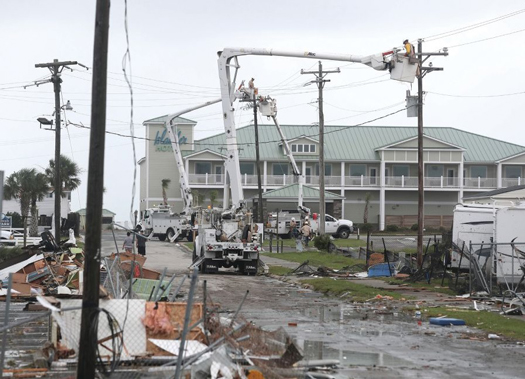Havoc-making storm slams U.S. coastline
By Brian E. Muhammad -Contributing Writer- | Last updated: Sep 11, 2019 - 9:29:10 AMWhat's your opinion on this article?

Power company lineman work to restore power after a tornado hit Emerald Isle, N.C. as Hurricane Dorian moved up the East Coast on Sept. 5.
|
COLUMBIA, S.C.—Following days of devastation in the Bahamas where Hurricane Dorian left fatalities and war zone-like damage, it slowly danced northward along America’s eastern seaboard to Florida, Georgia, the Carolinas, and Virginia. By the time it touched the U.S. border, Dorian had downgraded from a rare Category 5 hurricane to a Category 2, then shifted back up to a Category 3 with dangerous wind gusts of 105 miles per hour.
Dorian made land fall as a Category 1 at Cape Hatteras in North Carolina with flash flooding and storm surges possible in other coastal parts of the state, southeast Virginia and continuing toward eastern Canada.
One meteorologist described the Atlantic Ocean as “angry” with “dangerously” active waves.
During a Sept. 5 press briefing with North Carolina Governor Roy Cooper, meteorologist Katie Webster estimated 13 tornadoes were seen in waters off of North Carolina.
Evacuations, states of emergencies and massive shutdowns of airlines and cities were in effect to try to mitigate the disaster. Nearly 600 flights were canceled in Florida as airlines waived fees and penalties for travelers changing plans or rescheduling flights. Similar courtesies were extended by hotels in the Sunshine State and top tourist markets.
According to the National Hurricane Center Sept. 5, upwards of 270,000 homes and businesses suffered power outages in South Carolina. Charleston and Myrtle Beach have suffered from previous significant weather conditions. Flooding is often expected under lighter circumstances. But the National Weather Service warned rain could reach between one and three inches per hour and lead to flash flooding. “Flash flooding is occurring and will continue to become more widespread across the eastern Carolinas and far southeast Virginia,” the National Hurricane Center cautioned.
“We have to respect the nature of the time and respect the fact of what the God has promised the Most Honorable Elijah Muhammad and the Honorable Minister Louis Farrakhan,” said Student Minister DeAndre Muhammad, Charleston, S.C., student minister for the Nation of Islam. “For years we have been taught to be prepared for times like this.”
Elijah Muhammad, the patriarch of the Nation of Islam, and his national representative, Minister Louis Farrakhan, have warned America is in the crosshairs of divine judgment for injustices done to Black and indigenous people over four centuries. These divine warners have stressed disasters would plague America, unusual rain, snow, earthquakes, cold and fires. “Allah, the God of Righteousness, is with us and He just Laughs at those who try to fight against Him. He has destroyed whole nations with less than the power of rain, hail, snow and earthquakes,” wrote Elijah Muhammad in his monumental book, “The Fall of America.” God does not need anything great to execute His judgment, he added. “He uses that which is with you, against you,” wrote Elijah Muhammad.
DeAndre Muhammad said though federal, state and local governments prepare and make efforts to handle natural disasters, divine providence cannot be ignored. Like many in Charleston, he didn’t evacuate his family and only experienced a power outage. The student minister said dealing with calamities without a spiritual and behavioral change isn’t enough. “Our best thing is to submit to do the will of Allah … prepare ourselves … but at the same time count the quality of submission … if we’re not then we will be in trouble,” he said.
Events like Dorian strain an already compromised infrastructure and economy in America and worldwide. An August 2019 World Economic Forum paper showing its last available figures warned in the decade between 2003 and 2013 global costs of disasters increased.
Natural disasters caused a total of $1.5 trillion in damage worldwide in those years, caused more than 1.1 million deaths and affected two billion people, according to a study by the United Nations Food and Agriculture Organization.
Dorian came at a time Americans across more than 3,500 miles were still recovering from the largest disasters since 2017, including Hurricanes Harvey, Irma, Maria, Florence and Michael, and the 2017 and 2018 California wildfires.
“Recovery following these devastating events will be a long-term process,” warned the Recovery Support Function Leadership Group, which consists of government agencies that facilitate funding disaster relief.
INSIDE STORIES AND REVIEWS
-
-
About Harriett ... and the Negro Hollywood Road Show
By Rabiah Muhammad, Guest Columnist » Full Story -
Skepticism greets Jay-Z, NFL talk of inspiring change
By Bryan 18X Crawford and Richard B. Muhammad The Final Call Newspaper @TheFinalCall » Full Story -
The painful problem of Black girls and suicide
By Charlene Muhammad -National Correspondent- » Full Story -
Exploitation of Innocence - Report: Perceptions, policies hurting Black girls
By Charlene Muhammad -National Correspondent- » Full Story -
Big Ballin: Big ideas fuel a father’s Big Baller Brand and brash business sense
By Bryan Crawford -Contributing Writer- » Full Story






 Click Here Stay Connected!
Click Here Stay Connected!








